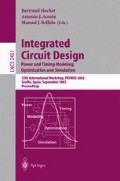Abstract
Power consumption is becoming one of the most important constraints for microprocessor design in nanometer-scale technologies. Device engineers, circuit designers, and system architects are faced with many challenges. In the area of mobile and embedded computer platforms, power has already been a major design constraint. However, it is also a limiting issue in general-purpose microprocessors. In order to manage the impact of increasing microprocessor power consumption, some architectural-level techniques are required as well as circuit-level design improvements. In this paper, we propose to make any instruction in the program execution flow non-critical by using a low-cost value predictor in order to improve energy efficiency. Based on simulations, we find that up to 11.4% of energy reduction in functional units can be attained by utilizing value prediction.
Access this chapter
Tax calculation will be finalised at checkout
Purchases are for personal use only
Preview
Unable to display preview. Download preview PDF.
References
Burger D., Austin T.M.: The SimpleScalar tool set, version 2.0. ACM SIGARCH Computer Architecture News, 25(3) (1997)
Calder B., Reinman G., Tullsen D.M.: Selective value prediction. 26th Int. Symp. on Computer Architecture (1999)
Casmira J., Grunwald D.: Dynamic instruction scheduling slack. Kool ChipsWorkshop (2000)
Fields B.A., Rubin S., Bodik R.: Focusing processor policies via critical-path prediction. 28th Int. Symp. on Computer Architecture (2001)
Hashimoto M., Onodera H.: Post-layout transistor sizing for power reduction in cell-based design. IEICE Trans. Fundamentals, E84-A(11) (2001)
Hiramoto T., Takamiya M.: Low power and low voltage MOSFETs with variable threshold voltage controlled by back-bias. IEICE Trans. Electronics, E83-C(2) (2000)
Intel Corporation: Intel(R) XScaleTM technology. http://developer.intel.com/design/intelxscale/ (2002)
Lee C., Potkonjak M., Mangione-Smith W.H.: MediaBench: a tool for evaluating and synthesizing multimedia and communications systems. 30th Int. Symp. on Microarchitecture (1997)
Levy M: Java to go: part 1: Microprocessor Report, 15(2) (2001)
Levy M. NEC processor goes out of order. Microprocessor Report, 15(9) (2001)
Lipasti M.H., Wilkerson C.B., Shen J.P.: Value locality and load value prediction. 7th Int. Conf. on Architectural Support for Programming Languages and Operation Systems (1996)
Morancho E., Llaberia J.M., Olive A.: Split last-address predictor. 8th Int. Conf. on Parallel Architectures and Compilation Techniques (1998)
Pyreddy R., Tyson G.: Evaluating design tradeoffs in dual pipelines. Workshop on Complexity-Effective Design (2001)
Sato T.: Evaluating the impact of reissued instructions on data speculative processor performance. Microprocessors and Microsystems, 25(9–10) (2002)
Sato T., Koushiro T., Chiyonobu A., Arita I.: Power and performance fitting in nanometer design. 5th Int. Workshop on Innovative Architecture for Future Generation High-Performance Processors and Systems (2002)
Sato T., Arita I.: Low-cost value predictors using frequent value locality. 4th Int. Symp. on High Performance Computing, LNCS2327 (2002)
Seng J.S., Tune E.S., Tullsen D.M.: Reducing power with dynamic critical path information. 34th Int. Symp. on Microarchitecture (2001)
Transmeta corporation: CrusoeTM processor model TM5800. Product Brief (2001)
Tune E., Liang D., Tullsen D.M., Calder B.: Dynamic prediction of critical path instructions. 7th Int. Symp. on High Performance Computer Architecture (2001)
Usami K., Horowiz M.: Clustered voltage scaling technique for low-power design. Int. Symp. on Low Power Design (1995)
Wang K., Franklin M.: Highly accurate data value prediction using hybrid predictors. 30th Int. Symp. on Microarchitecture (1997)
Wet L., Chen Z., Johnson M., Roy K.: Design and optimization of low voltage and high performance dual threshold CMOS circuits. Int. Design Automation Conf. (1998)
Author information
Authors and Affiliations
Editor information
Editors and Affiliations
Rights and permissions
Copyright information
© 2002 Springer-Verlag Berlin Heidelberg
About this paper
Cite this paper
Sato, T., Arita, I. (2002). Reducing Energy Consumption via Low-Cost Value Prediction. In: Hochet, B., Acosta, A.J., Bellido, M.J. (eds) Integrated Circuit Design. Power and Timing Modeling, Optimization and Simulation. PATMOS 2002. Lecture Notes in Computer Science, vol 2451. Springer, Berlin, Heidelberg. https://doi.org/10.1007/3-540-45716-X_38
Download citation
DOI: https://doi.org/10.1007/3-540-45716-X_38
Published:
Publisher Name: Springer, Berlin, Heidelberg
Print ISBN: 978-3-540-44143-4
Online ISBN: 978-3-540-45716-9
eBook Packages: Springer Book Archive

